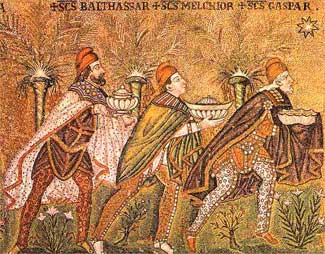2005 12 22
By Chuck Missler | khouse.org

Three Wise Men (The Three Kings) - Balthazar, Melchior and Gasper. Image from wilsonsalmanac.com |
Each year as we approach the holiday season, our preparations for Christmas include revisiting the events surrounding the birth of Our Lord. Bethlehem, the shepherds, and the angels are all familiar to us. But not much is generally known about the mysterious Magi who came to worship the infant Jesus.
Most of what we associate with the Magi is from early church traditions. They are called "Magi" from the Latinized form of the Greek word magoi, transliterated from the Persian for a select sect of priests. (Our word "magic" comes from the same root.) Most have assumed that there were three Magi. However the Bible mentions only that there were three gifts, it does not say how many men came to worship Jesus.
As the years passed, traditions became increasingly embellished. By the third century, they were viewed as kings. By the sixth century they had names: Bithisarea, Melichior, and Gathaspa. Some even associated them with Shem, Ham and Japheth, the three sons of Noah, and thus with Asia, Africa, and Europe. A fourteenth century Armenian tradition identifies them as Balthasar, King of Arabia; Melchior, King of Persia; and Gasper, King of India.
The Priesthood of the Medes
The ancient Magi were a hereditary priesthood of the Medes credited with profound and extraordinary religious knowledge. After some Magi, who had been attached to the Median court, proved to be expert in the interpretation of dreams, Darius the Great established them over the state religion of Persia.
It was in this dual capacity whereby civil and political counsel was invested with religious authority, that the Magi became the supreme priestly caste of the Persian Empire, and continued to be prominent during the subsequent Seleucid, Parthian, and Sasanian periods.
The Role of Daniel
One of the titles given to Daniel was Rab-mag, the Chief of the Magi. His unusual career included being a principal administrator in two world empires: the Babylonian and the subsequent Persian Empire. When Darius appointed him, a Jew, over the previously hereditary Median priesthood, the resulting repercussions resulted in the plots leading to the lion's den.
Living six centuries before the birth of Christ, Daniel was given an incredible number of Messianic prophecies. In addition to several overviews of Gentile world history, the Angel Gabriel told him the precise day that Jesus would present Himself as King to Jerusalem. Daniel apparently entrusted the Magi with a messianic vision (to be announced in due time by the appearance of a star).
The Entourage to Jerusalem
The sudden appearance of the Magi certainly alarmed Herod and the populace of Jerusalem. They were probably traveling in force, with every imaginable oriental pomp, and accompanied by adequate cavalry escort to insure their safe penetration of Roman territory. It would seem to Herod as if these Magi were attempting to perpetrate a border incident, which could bring swift reprisal from Parthian armies. Their request of Herod regarding the one "who has been born King of the Jews" was a calculated insult to him, a non-Jew who had contrived and bribed his way into that office. Consulting his scribes, Herod discovered from the prophecies in the Tanach (the Old Testament) that the Promised One, the Messiah, would be born in Bethlehem. Hiding his concern and expressing sincere interest, Herod requested them to keep him informed. After finding the babe and presenting their prophetic gifts, the Magi "being warned in a dream" departed to their own country, ignoring Herod's request.
The gifts of gold, frankincense, and myrrh were also prophetic, speaking of our Lord's offices of king, priest, and savior. Gold speaks of His kingship; frankincense was a spice used in the priestly duties; and myrrh was an embalming ointment signifying His death. In the millennium, He will also receive the gifts of gold and frankincense; but no myrrh. His death was once and for all.
For more information on this topic listen to our briefing called The Christmas Story (see links below).
Related Links:
Bible Study Resources: Christmas - Koinonia House
The Christmas Story - MP3 Download - Koinonia House Store
Your Seasonal Favorites in MP3 on CDROM - This Week's Special! - Koinonia House Store
Article from: http://www.khouse.org/enews_article/2005/1011/print/
Related: When Was Jesus Christ Born?
Where Did Christianity Really Come From?
